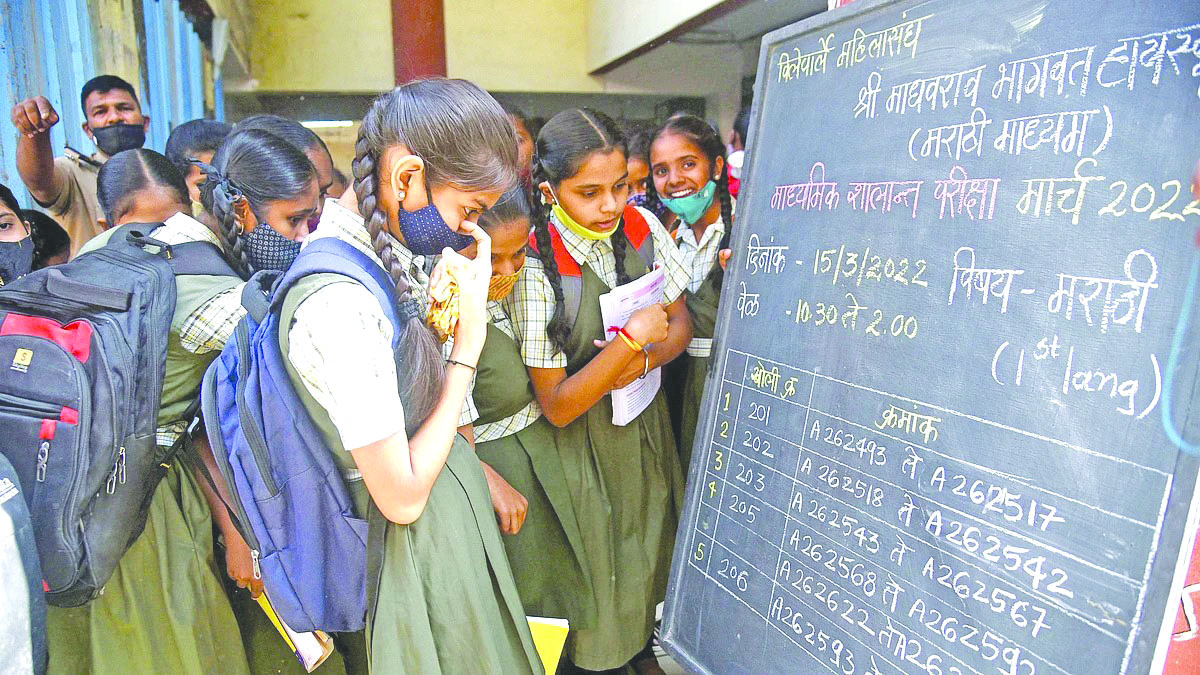Megha Chowdhury (Mumbai)

Marathi medium students: steadily declining number
In all states of the indian union ill-advisedly reorganised on the basis of linguistic majoritarianism in 1956, imposition of the dominant language as the medium of instruction in schools is high on the agenda of political parties, with none of them bothering about developing and contemporising these languages. Even within academia most educationists advise early childhood and primary education in the mother tongue. This dominant opinion is reiterated by the National Education Policy (NEP) 2020, which despite a Supreme Court judgement delivered in 2012 after many years of contention, clearly ruling that parents are the best judges of medium of instruction for children.
It’s well documented — especially by EducationWorld — that professed cultural pride and love of vernacular languages of politicians and language chauvinists is rooted in numerous rackets — textbook writing and printing contracts and well-paid teachers jobs for under-qualified kith and kin. Meanwhile in EWS households across the country there is profound and rising awareness that English/Inglish learning from earliest age is the passport to prosperity and upward social mobility.
Therefore, it’s unsurprising that Maharashtra’s Marathi-medium school system, especially in Mumbai, is in visible decline. Over the past six years, 40 Marathi-medium schools have downed shutters, with student enrolment dropping by 35 percent. According to data from the Brihanmumbai Municipal Corporation (BMC) and the Unified District Information System for Education (UDISE), student enrolment in Marathi-medium schools in Mumbai has fallen from 1.32 lakh in 2019-20 to 85,000 in 2024-25 with the number of Marathi-medium schools declining from 461 to 421.
“The Maharashtra government claims Marathi-medium schools are flourishing. But the ground reality is the opposite,” says Shripad Bhalchandra Joshi, convener of the campaign group Chalval Marathi Chya Vyapak Hitasaathi. “This decline is not just painful, it is unacceptable.”
With student numbers in state and municipal government schools that provide Marathi medium education declining continuously, Marathi language champions are demanding accountability and explanation. Joshi has written to chief minister Devendra Fadnavis, school education minister Deepak Kesarkar, and Marathi language minister Mangal Prabhat Lodha demanding a white paper on the current status of Marathi-medium education. The campaign group also wants transparency on the number of school closures across Maharashtra and details of planned revival efforts.
Girish Samant, trustee of the AB Goregaonkar School in central Mumbai, warns that unless the BJP-Shiv Sena government intervenes, the future of Marathi-medium education in Mumbai will be permanently compromised. “We need a dedicated education think-tank to study the decline and recommend a revival plan. Parents are not enemies of Marathi — they just want good quality education in Marathi. If government invests in infrastructure, teacher training, and mounts a public awareness campaigns, there is still time to reverse this trend,” says Samant.
However almost 80 years after the boundaries of India’s 29 states were redrawn on the basis of dominant language in 1956 by the States Reorganisation Commission, parents from bottom-of-pyramid households, compelled to enroll children in local, free-of-charge government schools providing Marathi medium instruction, have cottoned on that English/Inglish — the language of the judiciary, business and link language of India — is the passport to upward socio-economic mobility. This explains the rapid multiplication of India’s affordable budget private schools (BPS) which provide — or claim to provide — affordable Inglish medium education, to over 400,000 countrywide. Levying tuition fees of Rs.100-4,000 per month, BPS — hate objects of bureaucrats and left intellectuals — have emerged as preferred alternatives of poor households at the bottom of professedly socialist India’s iniquitous socio-economic pyramid.
Comments Prasid Gokhale, a Mumbai-based daily wage labourer: “I have enrolled my son in a BPS after taking a high interest loan. I want him to learn Inglish to be able to talk to officers, which I haven’t been able to do.”
It would perhaps be advisable for democratically elected governments to pay heed to the voices and aspirations of the poor whose children are obliged to attend Marathi medium schools, instead of imposing their will upon them.
Also Read: Delhi: Edu minister pledges crackdown on private schools for arbitrary fee hikes






















